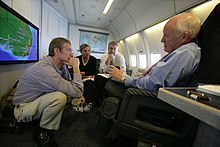
Bandar bin Sultan Al Saud is a retired Saudi Arabian diplomat, military officer, and government official who served as Saudi Arabia's ambassador to the United States from 1983 to 2005. He is a member of the House of Saud. From 2005 to 2015 he served as secretary general of the National Security Council, and was director general of the Saudi Intelligence Agency from 2012 to 2014. From 2014 to 2015 he was King Abdullah's special envoy.

Paul Dundes Wolfowitz is an American political scientist and diplomat who served as the 10th President of the World Bank, U.S. Deputy Secretary of Defense, U.S. Ambassador to Indonesia, and dean of Paul H. Nitze School of Advanced International Studies (SAIS) at Johns Hopkins University. He is currently a visiting scholar at the American Enterprise Institute.

Iran and the United States have had no formal diplomatic relations since 7 April 1980. Instead, Pakistan serves as Iran's protecting power in the United States, while Switzerland serves as the United States' protecting power in Iran. Contacts are carried out through the Iranian Interests Section of the Pakistani Embassy in Washington, D.C., and the US Interests Section of the Swiss Embassy in Tehran. In August 2018, Supreme Leader of Iran Ali Khamenei banned direct talks with the United States.

Seymour Myron "Sy" Hersh is an American investigative journalist and political writer. He gained recognition in 1969 for exposing the My Lai massacre and its cover-up during the Vietnam War, for which he received the 1970 Pulitzer Prize for International Reporting. During the 1970s, Hersh covered the Watergate scandal for The New York Times, also reporting on the secret U.S. bombing of Cambodia and the Central Intelligence Agency's (CIA) program of domestic spying. In 2004, he detailed the U.S. military's torture and abuse of prisoners at Abu Ghraib in Iraq for The New Yorker. Hersh has won a record five George Polk Awards, and two National Magazine Awards. He is the author of 11 books, including The Price of Power: Kissinger in the Nixon White House (1983), an account of the career of Henry Kissinger which won the National Book Critics Circle Award.
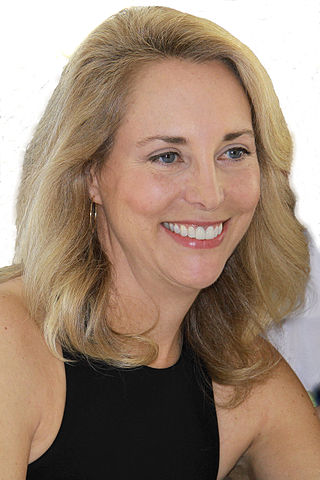
Valerie Elise Plame is an American writer, spy, novelist, and former Central Intelligence Agency (CIA) officer. As the subject of the 2003 Plame affair, also known as the CIA leak scandal, Plame's identity as a CIA officer was leaked to and subsequently published by Robert Novak of The Washington Post. She described this period and the media firestorm that ensued as "mortifying, and I think I was in shock for a couple years".

The National Commission on Terrorist Attacks Upon the United States, commonly known as the 9/11 Commission, was set up on November 27, 2002, to investigate all aspects of the September 11 attacks, the deadliest terrorist attack in world history. It was created by Congressional legislation, which charged it with preparing "a full and complete account of the circumstances surrounding the September 11 attacks", including preparedness by the U.S. federal government for the attacks, the response following the attacks, and steps that can be taken to guard against a future terrorist attack.

John Dimitri Negroponte is an American diplomat. In 2018, he was a James R. Schlesinger Distinguished Professor at the Miller Center for Public Affairs at the University of Virginia. He is a former J.B. and Maurice C. Shapiro Professor of International Affairs at the George Washington University's Elliott School of International Affairs. Prior to this appointment, he served as a research fellow and lecturer in international affairs at Yale University's Jackson Institute for Global Affairs, United States Deputy Secretary of State (2007–2009), and the first ever Director of National Intelligence (2005–2007).

Joseph Charles Wilson IV was an American diplomat who was best known for his 2002 trip to Niger to investigate allegations that Saddam Hussein was attempting to purchase yellowcake uranium; his New York Times op-ed piece, "What I Didn't Find in Africa"; and the subsequent leaking by the Bush/Cheney administration of information pertaining to the identity of his wife Valerie Plame as a CIA officer. He also served as the CEO of a consulting firm he founded, JC Wilson International Ventures, and as the vice chairman of Jarch Capital, LLC.

The Niger uranium forgeries were forged documents initially released in 2001 by SISMI, which seem to depict an attempt made by Saddam Hussein in Iraq to purchase yellowcake uranium powder from Niger during the Iraq disarmament crisis. On the basis of these documents and other indicators, the governments of the United States and the United Kingdom asserted that Iraq violated United Nations sanctions against Iraq by attempting to procure nuclear material for the purpose of creating weapons of mass destruction.
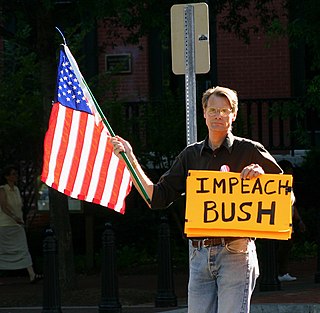
During the presidency of George W. Bush, several American politicians sought to either investigate Bush for possible impeachable offenses, or to bring actual impeachment charges on the floor of the United States House of Representatives Judiciary Committee. The most significant of these efforts occurred on June 10, 2008, when Congressman Dennis Kucinich, along with co-sponsor Robert Wexler, introduced 35 articles of impeachment against Bush to the U.S. House of Representatives. The House voted 251 to 166 to refer the impeachment resolution to the Judiciary Committee on June 11, where no further action was taken on it. Bush's presidency ended on January 20, 2009, with the completion of his second term in office, rendering impeachment efforts moot.
The Plame affair was a political scandal that revolved around journalist Robert Novak's public identification of Valerie Plame as a covert Central Intelligence Agency officer in 2003.

Lawrence B.Wilkerson is a retired United States Army Colonel and former chief of staff to United States Secretary of State Colin Powell.
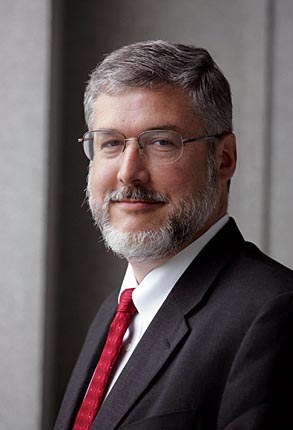
David Spears Addington is an American lawyer who was legal counsel (2001–2005) and chief of staff (2005–2009) to Vice President Dick Cheney. He was the vice president of domestic and economic policy studies at The Heritage Foundation from 2010 to 2016.
Donald Phinney Gregg is a retired American politician, CIA employee, and U.S. Ambassador to South Korea. Gregg worked for the Central Intelligence Agency for 31 years, from 1951 to 1982. He was a National Security Council advisor (1979–1982) and National Security Advisor to U.S. Vice President George H. W. Bush (1982–1989), United States Ambassador to Korea (1989–1993), and the chairman of the board of The Korea Society, where he called for greater engagement with North Korea.

There are various rationales for the Iraq War, both the 2003 invasion of Iraq and the subsequent hostilities. The George W. Bush administration began actively pressing for military intervention in Iraq in late 2001. The primary rationalization for the Iraq War was articulated by a joint resolution of the United States Congress known as the Iraq Resolution. The US claimed the intent was to "disarm Iraq of weapons of mass destruction, to end Saddam Hussein's support for terrorism, and to free the Iraqi people".

Richard Bruce Cheney is an American retired politician and businessman who served as the 46th vice president of the United States from 2001 to 2009 under President George W. Bush. Often cited as the most powerful vice president in American history, Cheney previously served as White House Chief of Staff for President Gerald Ford, the U.S. representative for Wyoming's at-large congressional district from 1979 to 1989, and as the 17th United States secretary of defense in the administration of President George H. W. Bush. He is the oldest living former U.S. vice president, following the death of Walter Mondale in 2021.
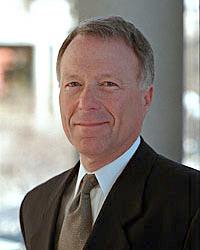
Irve Lewis "Scooter" Libby is an American lawyer and former chief of staff to Vice President Dick Cheney known for his high-profile indictment and clemency.
Membership in the Council on Foreign Relations comes in two types: Individual and Corporate. Individual memberships are further subdivided into two types: Life Membership and Term Membership, the latter of which is for a single period of five years and is available to those between the ages of 30 and 36 at the time of their application. Only U.S. citizens and permanent residents who have applied for U.S. citizenship are eligible. A candidate for life membership must be nominated in writing by one Council member and seconded by a minimum of three others.

Brian H. Hook is an American diplomat, lawyer and government official. In 2021, he joined Cerberus Capital Management as vice chairman for global investments. He is an adjunct professor at Duke University's Sanford School of Public Policy.

Robert James Woolsey Jr. is an American political appointee who has served in various senior positions. He headed the Central Intelligence Agency as Director of Central Intelligence from February 5, 1993, until January 10, 1995. He held a variety of government positions in the 1970s and 1980s, including as United States Under Secretary of the Navy from 1977 to 1979, and was involved in treaty negotiations with the Soviet Union for five years in the 1980s. His career also included time as a professional lawyer, venture capitalist and investor in the private sector.
